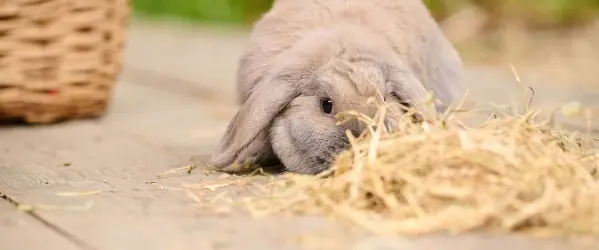What do rabbits eat
Like all animals, rabbits need the correct diet to be happy and healthy. Not feeding rabbits a healthy diet will not only impact their weight, but can lead to dental problems and even cause fly strike. But what do rabbits eat? We’ve put together this guide to help you ensure you’re feeding a healthy rabbit diet.
What is a healthy rabbit diet?
To ensure you’re feeding a healthy and well-balanced rabbit diet, you should be giving your rabbits:
- Hay
- Extruded rabbit food
- Vegetables and leafy greens
- Occasional treats (eg. fruit)
- Water
The visual on the right from the Pet Food Manufacturers Association (PFMA) is a simple way to help you remember what makes up a healthy rabbit diet. It can also be downloaded from their website.
When it comes to food, good quality hay makes up the majority of a healthy rabbit diet. Rabbits should eat a portion of hay roughly the same size as their body every day. Hay is an excellent source of fibre, which helps keep a rabbit’s teeth in good condition and aids digestion.
Alongside hay, rabbits should be fed a small portion of extruded food, such as Beaphar CARE+® Rabbit . The pellets in extruded rabbit food are nutritionally identical, ensuring rabbits get the correct balance of nutrients. If you feed your rabbits a muesli diet, selective feeding may occur. Rabbits are drawn to the tasty, sugary elements of the mix, often leaving behind the more nutritionally beneficial parts.
To feed a healthy rabbit diet, you must make sure you’re feeding the correct amount of food for your pets’ weight. Feeding too much or too little rabbit food will lead to obesity or malnutrition.
Leafy greens and vegetables add texture and variety to your rabbit’s diet. They also provide essential nutrients to help keep them healthy.
Fresh drinking water is essential for all animals and should be available to your rabbits at all times. Water bowls and/or bottles need cleaning daily, and refilling with fresh, clean water every day. You should also check that water bottles are working. Some rabbits prefer bowls while others favour bottles, so it’s useful to provide your rabbits with both.
Can I give my pet treats as part of a healthy rabbit diet?
We love a treat now and then, and rabbits are no different. And providing they are given in moderation, treats can be fed as part of a healthy rabbit diet. Giving your rabbits a treat is a brilliant way to bond with your pet. This can be useful if you’ve recently brought your rabbits home. Alongside helping you and your rabbits bond, hand-feeding treats can help them get used to gentle handling.
Natural treats are ideal, but fruit and many vegetables, such as carrots, contain large amounts of sugar. Feeding your rabbit too many sugary treats could lead to obesity. The important thing to remember when giving your rabbits treats is to feed small amounts in moderation. Alternatively, you can choose functional treats from your local pet shop.
Beaphar Dental Easy Treats, or example, not only give your rabbits a little indulgence but also support their dental health. You can find out more about our range of small animal treats here.
What else can I do to make feeding fun for my rabbit?
Feeding your rabbits the correct diet is important, but you can also use food to meet your rabbits’ behavioural needs. Rabbits are natural foragers, so encouraging this behaviour keeps them engaged and moving around.
Instead of giving your rabbit their food or vegetables in a bowl, you could try spreading them around their hutch and run. Alternatively, you could hide them in hay or use a puzzle toy. These activities will stimulate your rabbits’ mental and physical well-being.
How can I tell if my rabbit is overweight or underweight?
Feeding your rabbits a healthy and well-balanced diet, alongside providing opportunities for exercise, should ensure they are a healthy weight. But continue to monitor your rabbits’ weight and overall health. Like all pets, your rabbits need yearly check-ups. During these appointments, the vet will check their weight and overall health. If your pet is over or underweight, your vet will be able to advise how to adjust your rabbit’s diet.
Depending on the breed of rabbit, their fur can be deceptive and hide their true size. The easiest way to determine if your rabbit is a healthy weight is to run your hands over their sides and spine. Be careful to do this gently, and talk to your rabbit in a soothing voice to reassure them. Rabbits may tolerate being handled, but as prey animals they will find rough handling distressing.
A healthy-sized rabbit will have a slight fat covering, but you should still be able to easily feel their ribs and spine. If they are protruding or feel sharp, your rabbit may be underweight. If it’s difficult to feel your rabbit’s ribs or spine, they may be overweight.
The PFMA have a handy Rabbit Size-O-Meter diagram to guide you. There is also a useful video to show you how to check your rabbit’s weight.
The easiest way to ensure your rabbits maintain a healthy weight is to feed a healthy rabbit diet. Alongside weight, it also helps with their dental health, while the addition of puzzle toys and occasional treats helps with behavioural enrichment and bonding.


